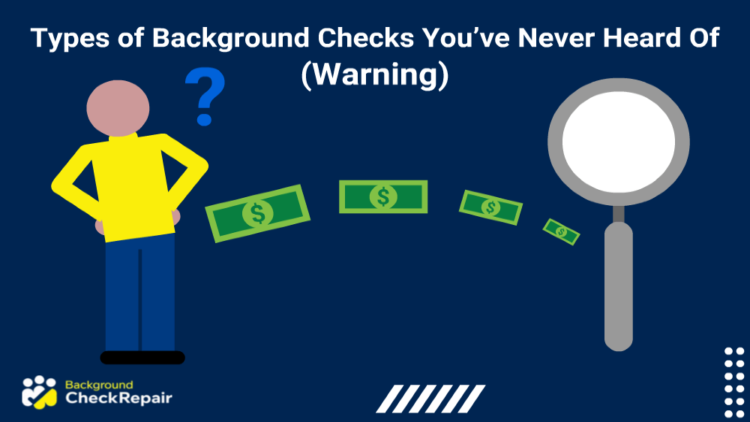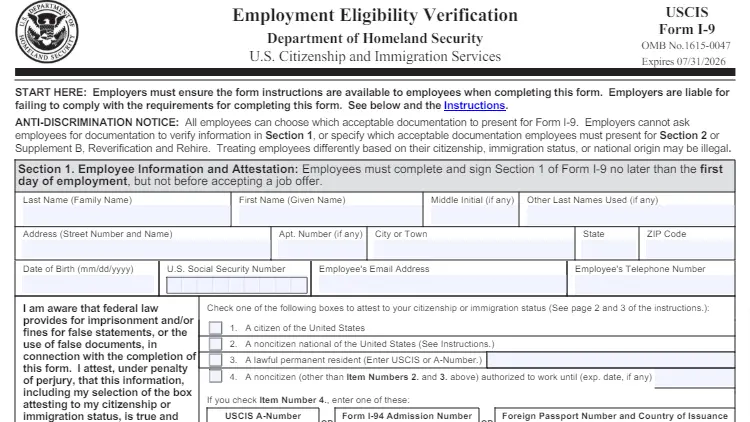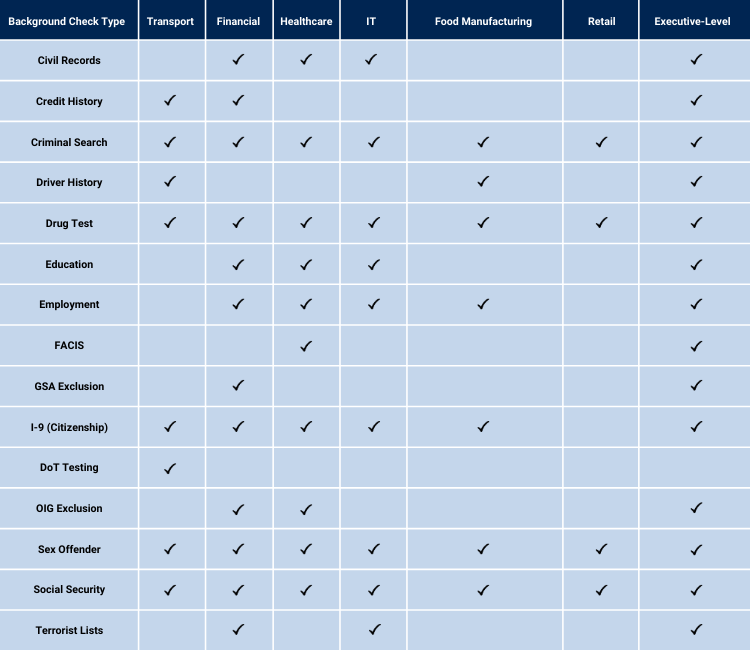We use cookies to ensure that we give you the best experience on our website. If you continue to use this site we will assume that you are happy with it
9 Types of Background Checks You’ve Never Heard Of (Warning)
 Written by Background Check Repair
Written by Background Check Repair
Background Checks | May 10, 2024

Table of Contents
While you may be familiar with some of the most common types of background checks used during the hiring process and for other situations, there are many more that you’ve probably never heard of. Specific types of background checks are used to address specific needs.
You might be thinking that your specific case does not call for these different types of background checks. But you should be warned that before you jump to that dangerous conclusion, there are a number of factors to consider.
The following guide outlines 9 types of background checks, why they are used, and why you need to know the various special situations that require a specific type of background check to ensure that you don’t face criminal or civil liability when performing a background check.
Although the following 9 types of background checks you’ve never heard of might seem unnecessary at first, by understanding why and when they are utilized, you’ll be protecting yourself against financial and legal liability, as well as from wasting precious time and money.
- Level 1 Records Check
- Level 2 Records Check
- Level 3 Records Check
- Level 4 Records Check
- Employment Background Checks by Industry
- Types of Criminal Background Checks
- FBI Background Check
- Financial Background Checks
- Personal Background Checks
Types of Background Checks by Level
Typically, certain types of background checks are categorized by level, which outlines the progressive nature of the records searches. Many other employment, rental, financial and personal background checks will fall into the levels listed below, but they aren’t always referred to by the name of the ‘level.’
Also, remember that these distinctions between levels aren’t codified by law, for the most part. Florida background check laws actually outline the difference between level 1 and level 2 background checks, but it is the only state to do so.
1. Level 1 Background Check Type
This is the least comprehensive of all the different types of background checks. In order to run a level 1 background check, you only require an applicant’s name, and some other basic information, which is searched within a local jurisdiction.
This means that no national information is delivered, and the name-based only check can be prone to identification errors.
This level of background check is acceptable for people who are applying for jobs that are not related to children, elderly people, or otherwise vulnerable groups that could be endangered by specific types of criminal behavior, as well as jobs that do not handle sensitive information or copious amounts of money.
Information needed for a level 1 background check includes:
- Signed consent (this is not applicable for personal background checks, as long as the information will not be used in any professional manner whatsoever. You don’t have to get consent to check the background of your child’s teacher, coach, or youth pastor, for example. However, for any professional application, such as a tenant or employment application, signed consent is required by law.)
- Full Name (and any other names they’ve used in the past)
- Date of Birth
- Current Zip Code
- Phone number
- Email address
- SSN
2. Level 2 Background Check Type
A level 2 background check steps up the records search to include federal information, and there is one major distinction between it and a level 1 check: fingerprints.
A level 2 background check is done at the national level using fingerprints in order to search the FBI database, which is shared among law enforcement agencies.
This level of background check includes many of the elements of its predecessor, but it also incorporates other, more thorough elements of investigation to ensure a full individual screening that provides reliable results.
The name-based search is replaced by a full 10-set fingerprint search of criminal databases, including sex offender registries.
3. Level 3 Background Check Type
Although a level 3 background check is not a common term, it is used to describe a records search that enhances the search to cross reference other criminal resources, as well as education, previous employment history, and possibly other background checks that have been performed.
The key thing differentiating a level 3 background check from the lower levels is the inclusion of reference checks.
Level 3 background checks, like level 2 checks, are commonly used for delicate positions that involve caring for people or handling sensitive documents and multi-million dollar transactions.
Additional information that may be required for this type of background check include:
- Prior Employment Verification
- Education Verification
- Reference Check
- Drug Screening
- Driving Record
- Professional License & Certificate Confirmation
- Identity Verification
4. Level 4 Background Check Type
A level 4 background check is another little known term that refers to a very detailed records search of an individual. Whenever you want to remember what this background check level is for, you should think of the word “Executive,” as it is most commonly used to screen individuals who are being considered for Chief Officer-level corporate positions.
Level 4 checks often include (but aren’t limited to):
- A fingerprint-based federal criminal search
- A national bankruptcy check, normally based on Chapter 77
- A Social Media check
- A civil court search
- A search for any mentions of the person in media, both online and on traditional formats like TV
5. Are There Different Types of Background Checks for Employment? (Employment Background Checks by Industry)
Employment verification processes are different, depending on the job. But whenever any type of background check is run for employment, it must be compliant with the Fair Credit reporting Act (FCRA).3

(Image: U.S. Citizenship and Immigration Services8)
The types of background checks for employment are based on need. For example, a nursing background check will be different from one for IT. Different vetting processes are needed for different jobs, and using specific types of background checks can ensure that employers comply with federal and state law, as well as protect yourself from civil liability.
Healthcare workers usually find themselves having to pass strict, thorough screening processes that resemble those that executives have to undergo.
Some of the different employment background checks (various levels) include:
- Transportation
- Financial Services
- Healthcare
- Manufacturing
- IT
- Food Manufacturing
- Retail
- Nonprofit Organizations
Do Different Types of Background Checks Require a Different Process?
Depending on the different responsibilities an individual will have during their everyday activities, certain types of background checks will require specific information.
The following chart illustrates the different elements that must be met depending on the industry:

6. Different Types of Criminal Background Checks
There are two basic types of background checks that are commonly used for screening prospective applicants, but that many people are unaware of.
Local (Level 1)
This usually fits in level 1 background checks, and it can include name-based searches of criminal records databases and sex offender registries. In order to run this, you’ll need to acquire your applicant’s full name, SSN, address, zip code, etc.
Federal (Level 2, 3 and 4)
These background checks cover a wider area of exploration, as they search nationwide databases with the information provided by an individual’s fingerprints. Any criminal offense, both sexual and not, will show up on this search.
This type of criminal background check is highly effective, as it is designed to prevent false negatives as a result of fake information provided by the applicant.
7. FBI Background Checks
An FBI criminal background check has a distinction that it is usually reserved for government level positions and other scenarios where enhanced security procedures are necessary, like promoter licensing and other licensing that may put government municipalities or their citizens at risk.
It uses fingerprints and can also involve personal interviews, assessing a person’s trustworthiness with national security matters.
It’s important to note that FBI background check terms are sometimes used to refer to level 2 background checks, but the ‘checks’ are not identical. A true FBI background check is much more in-depth than a level 2.
The process to perform this background check can be complicated, as the following steps must be followed to a tee.
- Have your applicant fill in and submit an Applicant Information Form. This form will ask many questions, including all former addresses, all former employers, all schools attended, personal references and more.
- Have your applicant place their fingerprints on an FD-1164 Form2.2 Fingerprints must be current (not copies), have DOB, and include all 10 fingers.
- Have your applicant review their documents.
- Ask them to mail them to: FBI CJIS Division – Summary Request 1000 Custer Hollow Road Clarksburg, WV 26306
A fast-track FBI background screen can be used to speed up the long process through the use of an approved channeler.
8. Financial and IT Background Checks
Workers in these industries must undergo special kinds of background checks, as they’re constantly in contact with sensitive information and databases that are vital to a company’s, or the government’s operations.

While it may seem like healthcare workers have to undergo a massive amount of investigations to land a job, these pale in comparison to the requirements tech and finance workers must meet before even being considered for a position. In addition to all the aforementioned elements that will be under scrutiny for the workers of other industries, the following information of tech and finance industries must be revised.
- General Services Administration/Excluded Parties List System (exclusion search)1
- Professional License Verification
- Terrorist Searches (Office of Foreign Asset Control, Office of the Superintendent of Financial Institutions)5
9. Personal Background Checks
A personal background check is a lot less regulated than employment verification and other screenings. But, there are many times when a personal background check is both wise and effective.
Many people utilize this type of background check to ensure that people who are directly in contact with their friends or family members don’t have a history of violent or criminal behavior. But, personal checks are also used to check a person’s finances before marriage, or to check other members of a group or club.
The main thing that differentiates personal background checks (like a marital records check) from other types is that if the information being searched will be used solely for personal use, the law does not require consent for these types of background checks.
Other Types of Background Checks Most Don’t Even Know Exist
In addition to basic types of background checks, there are some specific employment checks that are used to verify potential employees, in particular those who will hold positions of security and the well being of others.
Nursing & Healthcare
Systems like the Fraud and Abuse Control Information System (FACIS)6 have been implemented in healthcare application processes as a way to properly evaluate and screen people looking to land a job in nursing homes or hospitals.

Along with these levels of investigation, people in the healthcare industry are no stranger to having the following information under investigation as well:
- Civil records
- Criminal records
- Drug testing
- Education Verification
- I-9 Document verification4
- Occupational testing
- Sexual Offender records
- Social Security trace
- Tuberculosis testing
How Long Each Type of Background Check Takes
There is no short answer for how long each type of background check will take. A general rule is…the more records that need to be searched, the longer it will take.
But the general rule of thumb for the completion of a records check is 1-2 weeks.
Background checks that involve federal agencies or require being run through special organizations such as the GSA, or the OIG will take considerably longer than those obtained from the wide variety of available online services, which are designed for less complicated job positions.
A level 1 background check and a level 2 background check are the most common screening processes and take roughly 1 to 2 weeks to complete. However, a background check for a would-be executive or an IT professional looking to land a job in the Department of Homeland Security could take several weeks, to several months.
There are some ways to expedite the process, but they’re not always available or applicable. An FBI background search, for example, could take considerably longer if requested through the FBI directly instead of through one of their several available channeler services.
To ensure the health and safety of the general public, as well as protect national security and private assets, various types of background checks are employed. Knowing which type of background check to use will protect you from criminal and civil liabilities that can occur when the laws concerning data searches and employment screenings are violated.
References
1Cornell Law School. (2024). 29 CFR § 1471.950 – Excluded Parties List System. Cornell Legal Information Institute. Retrieved May 2, 2024, from <https://www.law.cornell.edu/cfr/text/29/1471.950>
2Federal Bureau of Investigation. (2024). Identity History Summary Request (FD-1164). FBI. Retrieved May 2, 2024, from <https://www.fbi.gov/file-repository/fd-1164-identity-history-summary-request-110120.pdf/view>
3Federal Trade Commission. (2024). Fair Credit Reporting Act. FTC.gov. Retrieved May 2, 2024, from <https://www.ftc.gov/legal-library/browse/statutes/fair-credit-reporting-act>
4U.S. Citizenship and Immigration Services. (2024, March 4). I-9, Employment Eligibility Verification. USCIS.gov. Retrieved May 2, 2024, from <https://www.uscis.gov/i-9>
5U.S. Department of the Treasury. (2024). Office of Foreign Assets Control. Tresury.gov. Retrieved May 2, 2024, from <https://ofac.treasury.gov>
6Verisys. (2024). FACIS® Data Supersource. Verisys. Retrieved May 2, 2024, from <https://verisys.com/solutions/facis/>
7Wikipedia. (2024, April 30). Chapter 7, Title 11, United States Code. Wikipedia. Retrieved May 2, 2024, from <https://en.wikipedia.org/wiki/Chapter_7,_Title_11,_United_States_Code>
8I-9 Employment Eligibility Verification. (2024). USCIS. Retrieved May 11, 2024, from <https://www.uscis.gov/sites/default/files/document/forms/i-9.pdf>
